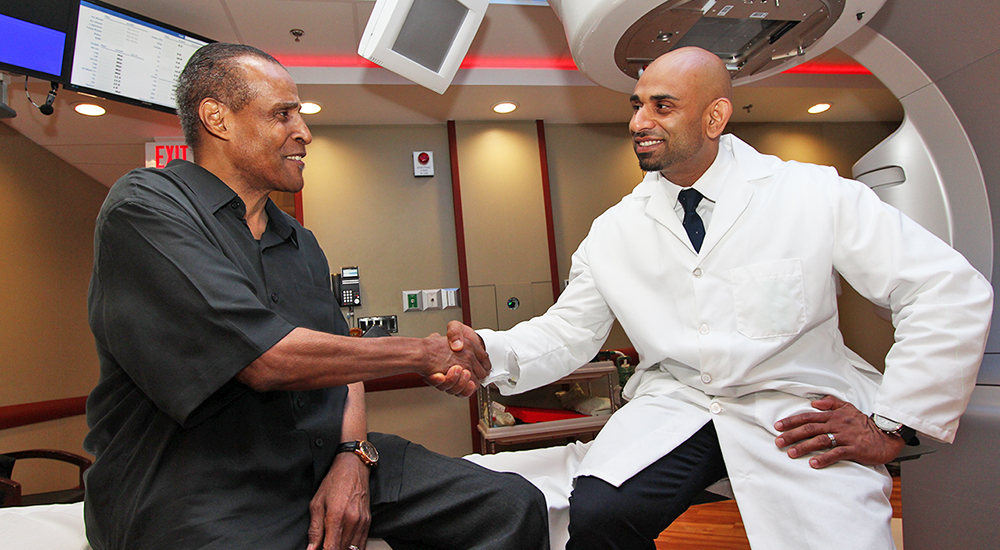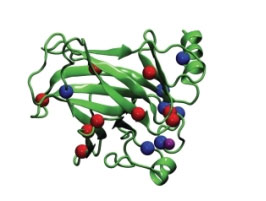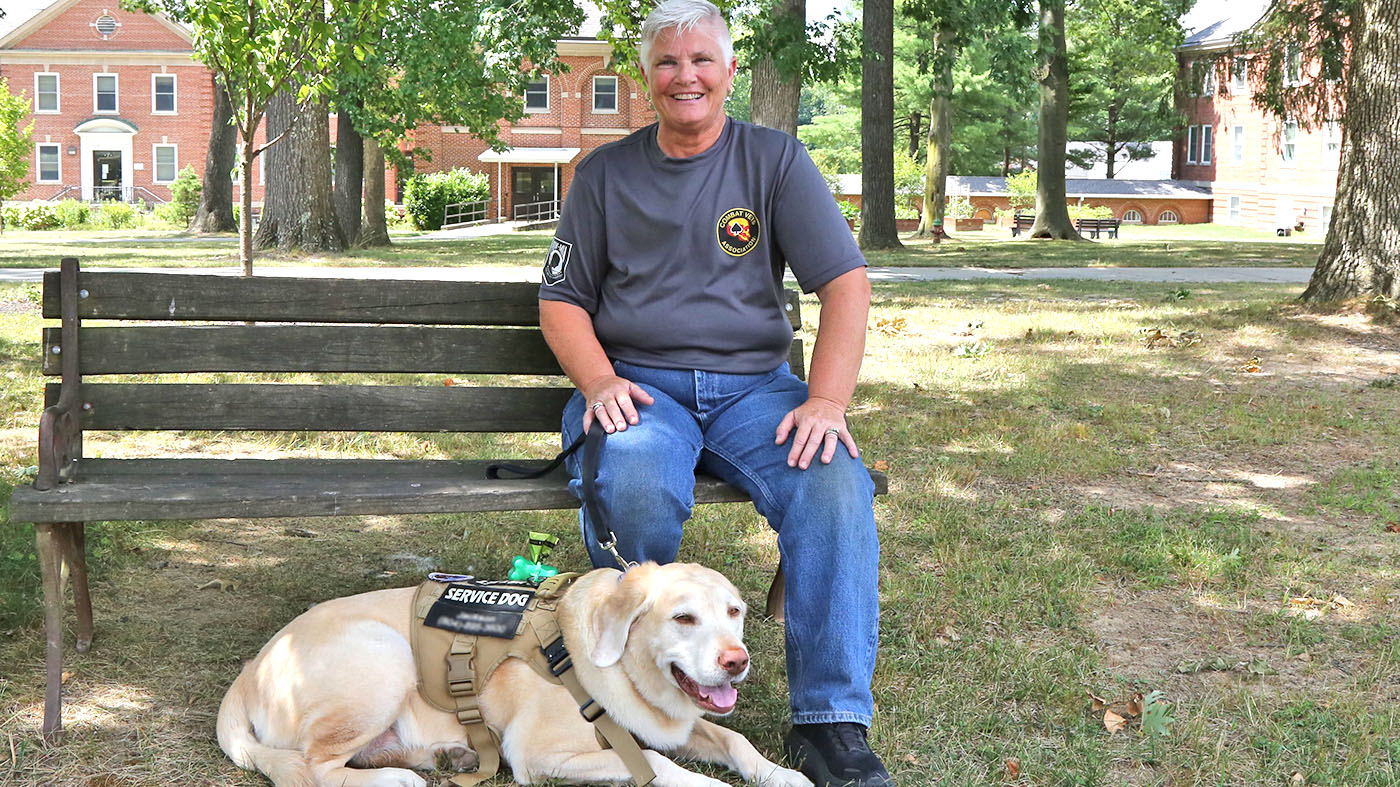Clarence Massey (above, left) received treatment for his prostate cancer at the Brooklyn campus of the VA NY Harbor Healthcare System. He is with radiation therapist Nader Girgis, who was part of his treatment team. (Photo by Mitch Mirkin)
As an Air Force mechanic in the 1960s, Clarence Massey worked on bombers and fighter jets in Vietnam.
More than four decades later, in 2010, he became immersed in another battle. The resident of New York City’s historic Harlem neighborhood underwent nine weeks of radiation therapy for prostate cancer.
The treatment itself wasn’t too bad, he recalls, but the side effects hit him “like a ton of bricks,” says Massey, now 72.
Massey’s outcome was a good one. He’s been in remission. He gives credit to his VA doctors, but, he says, “Mostly I give credit to God. I’m blessed.”
In the years since Massey’s bout with cancer, biomedicine has come a long way—especially when it comes to analyzing genes and proteins. VA and two federal partners—the Department of Defense and the National Cancer Institute—are looking to harness the power of this science through an effort dubbed APOLLO, in the spirit of the famous space mission that landed men on the moon. The research program is described in full detail in an article now online in the journal Clinical Pharmacology & Therapeutics.
The project initially launched in 2016 under the federal Cancer Moonshot, a broader effort likewise inspired by the space theme.
It’s all about precision oncology
The full title of APOLLO sounds complex: Applied Proteogenomics Organizational Learning and Outcomes. But the overarching goal is simple: individualize cancer treatment. That’s what “precision oncology” is all about.
“Each patient is unique, and each tumor is unique,” explains Dr. Craig Shriver, one of the architects of APOLLO. He directs the Murtha Cancer Center Research Program in the department of surgery at the Uniformed Services University of the Health Sciences, in Bethesda, Maryland.
APOLLO, he says, is collecting a wide array of data from patients, on a scale that is largely unprecedented in cancer research. The data will be analyzed with the help of sophisticated technology—including artificial intelligence—and scientists worldwide. Ultimately, the findings will be used to determine the best precision treatment for a given patient.
The main beneficiaries in the short term will be Veterans and active-duty troops, as cancer care at VA and military hospitals increasingly incorporates knowledge gained through APOLLO. The knowledge will eventually filter into medical care at large, so cancer patients everywhere can see better treatment.
Goal is 8,000 patients in five years
APOLLO is starting operations at 10 military hospitals and one VA site (Palo Alto), with additional VA sites likely to be on board by late 2019. There is also one civilian hospital involved, Anne Arundel Medical Center in Maryland. Cancer patients at these facilities can agree to have their information—including molecular results from their tumors—added to the growing APOLLO research database. All information is coded, so patients are not personally identifiable to researchers. The enrollment target is 8,000 patients over five years.
The effort will work hand in hand with VA’s Precision Oncology Program. Through POP, increasing numbers of VA patients with cancer are having their tumors genetically analyzed, so their physicians can prescribe more targeted therapies, or so they can be referred to appropriate clinical trials.
Vietnam Veteran Clarence Massey is thankful his battle with cancer is long behind him. For others his age and younger who are destined to face a similar challenge, APOLLO and its deep dive into the science of cancer is likely to mean better treatment, and added years of life.
To read a longer version of this article, visit VA Research Currents.
 May 13 – 17 is Research Week
May 13 – 17 is Research Week
“The Science of Hope”
VA Research Week gives VA medical centers an opportunity to showcase the numerous achievements of VA researchers and the role they play in providing high-quality care for Veterans and advancing medical science. Creative displays, staff interactions, and informative seminars help educate Veterans, our elected representatives, and others about VA research and its impact on treating and preventing disease and disability, not only for Veterans but all Americans.
Topics in this story
More Stories
Combat Veteran faces the traumatic events of her PTSD during prolonged exposure therapy and looks forward to the days to come.
Bob Jesse Award celebrates the achievements of a VA employee and a team or department that exemplifies innovative practices within VA.
The Medical Foster Home program offers Veterans an alternative to nursing homes.








I had surgery for prostate cancer, then had to go back for radiation once a week for 34 weeks. Sence my cancer is in remission at this time the VA reduced my compensation by two thirds. So now I get to wait to see if it comes back.Thanks for nothing.
Roderick – It is Prostate Cancer.
Roderick – it is not Prostrate Cancer, it is Prostate Cancer.
I have received fantastic care at several NorCal/ Bay Area V.A.s for 10 years, the last 8 for chemotherapy for Agent Orange-caused lymphoma. I also enrolled in the MVP program 2 years ago. The V.A. researchers, with BigPharma and Oncologists, have helped so many of us. All improvements, if needed, are welcome!
Any info on LU-177 treatment?
What you read above is great but please bug your Senators or Representative contract the Veteran Affairs Committee passed a new Benefit Law definitely need to have Cosmetic Dentistry Dentist G4 implants for free because their is no Veteran Medical Centers and don’t have a contract with the Veteran Affairs Administration but unfortunately they have Cosmetic Dentistry Dentist G4 implants Clinics but the majority of the Disabled Veterans is 100 percent service connected can’t afford to pay Cosmetic Dentistry Dentist G4 implants and if a Disabled Veterans is one hundred service connected don’t get the Cosmetic Dentistry Dentist G4 implants it’s cause really bad Health Care also it will cause bad gum disease and possible cause Cancer Thanks for your Support and Stay Healthy and your Family.
I think individual psychiatric and counseling services at the VA are horrible. I am a psychiatric nurse and worked that area for 10 years. I have needed psychiatric and counseling for many many years because of childhood sexual abuse issues. I have tried to get help to the VA and I know what help it looks like and feels like. They help with the VA is useless. It does not comply with any psychotherapeutic ethical and other treatment modalities. It’s a Kia tryst I went to is way way out of two and sings the same song every year. She needs to go she is very demeaning rude and ugly to the patients. You cannot obtain psychotherapy with any one person for any two weeks in a row you can only go once in a while and see a different therapist every single time. That is totally unethical and unhelpful. You can’t get an appointment in mental health the way over 30 days and yet they say they ran out of money for the choice program here in Austin Texas. I was in the I was in the CHOICE program here two go rounds and then suddenly they stopped it. How helpful is that? And no one would tell me why. I found out later it was money so they didn’t offer me any alternatives or any help to the VA except therapy with a different person every month maybe every other month.
Great to hear about the Apollo and POP cancer fighting initiatives. Hope they arrive soon at the Puerto Rico VA Hospital.
Congrats to all for the researchers, Doctors, nurses and all for the long hours invested in the investigations.
What does awaiting moderation mean
Each comment is reviewed before it is posted publicly. We do this mainly to prevent spam and to protect Veterans information.
A number of Veterans are compelled to include their social security number, email and home address in their comments which places them at a high risk for stolen identity. I read each comment and delete that type of information and note it by replacing it with “(redacted)”.
Please after over 50 years realize that “Bladder Cancer “ as is Prostrate Cancer is also caused by Agent Orange. They are attached, so many of my brothers have already died and so many of us continue to suffer with it. We deserve compensation for our bills and suffering. Please before I also die from it make it a cause of Exposure to agent orange
I am going through cemo for bladder cancer At Phx Va and I can say I had GRATE car . I well be losing my bladder I well be going too Mayo in AZ
In June for the Surgery can’t ask any Better
then that. I also too have a Heart valve repair beforehand at Banner heart . Yes All takin care off by theVA I give the phx va as tops in my case they really care about the. Vets they take care off.